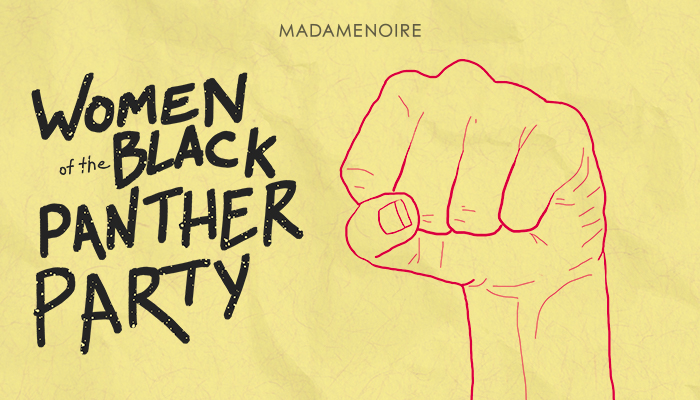
Source: Creative / Creative
When we think of the Black Panther Party, we imagine Huey Newton positioned powerfully in a rattan chair. We picture black leather-clad men in black berets throwing up the Black power fist. And while those images are powerful, they don’t tell the entire truth about the party.
In reality, according to The International Socialist Review, the party was predominately female. In fact. in a survey conducted in 1969 by Chairman Bobby Seale, membership was 60 percent female. But despite their dominance in the party and their innumerable contributions, sexism has ensured that the significance of their role has been diminished with the passage of time.
And while Black women had been integral to the party’s success almost from the start, developing schools, writing the newsletter, feeding children breakfast in the morning, there are claims that it was marred by sexism.
It was evidenced in the appointment of Eldridge Clever as the minister of information in 1967. Clever, was a convicted rapist who wrote in his memoir Soul on Ice, that he viewed raping White women as a revolutionary act. But he claimed that he “practiced” on Black women to start.
Later though, perhaps Cleaver evolved, even calling out the sexism present in the party.
“Let it be a lesson and an example to all of the sisters, particularly to all of the brothers, that we must understand that our women are suffering strongly and enthusiastically as we are participating in the struggle. The incarceration and the suffering of Sister Ericka should be a stinging rebuke to all manifestations of male chauvinism within our ranks . . . That we must too recognize that a woman can be just as revolutionary as a man and that she has equal status . . . That revolutionary standards of principles demand that we go to great lengths to see to it that disciplinary action is taken on all levels against those who manifest male chauvinism behavior.”
Similar statements were echoed by Huey Newton and Bobby Seale.
In a 2017 video celebrating the 50th anniversary of the Panthers, Seale famously tells a story about chastising men in the party who thought they should eat before the very women who had prepared the food.
For a lot of women, this movement represented the best option at the time. Famous Panther Assata Shakur said she joined the party in New York because other organizations didn’t know how to handle gender.
“The BPP was the most progressive organization at that time [and] had the most positive images in terms of . . . the position of women in the propaganda . . . I felt it was the most positive thing that I could do because many of the other organizations at the time were so sexist, I mean to the extreme . . . There was a whole saturation of the whole climate with this quest for manhood . . . even though that might be oppressive to you as a human being . . . For me joining the BPP was one of the best options at the time.”
While there were glimmers of hope that a woman’s role in the organization would be recognized and celebrated, its downfall came, partially because sexism in the party not only went unchecked, it was encouraged by its founder Huey Newton.
According to The Washington Post, 1974, Elaine Brown became the first and only woman to lead the party. A lover of Huey Newton she took over leadership while he went into exile in Cuba to avoid charges of allegedly killing a 17-year-old prostitute.
When he returned in 1977, Newton was met with criticism from the male members of the party that the women had been granted too much control. Brown, in her 1992 memoir A Taste of Power: A Black Woman’s Story, Brown said that the men told Newton that Regina Davis, the school’s administrator had publicly reprimanded a male member of the party. Newton gave the men permission to beat Davis. As a result, she ended up in the hospital with a broken jaw.
The violence directed toward Davis convinced Brown that it was time for her to leave.
“The beating of Regina would be taken as a clear signal that the words ‘Panther’ and ‘comrade’ had taken on gender connotations,” Brown wrote, “denoting an inferiority in the female half of us.”
Brown said she confronted Newton about the beating but he was unmoved. She resigned from the party, quickly packed her bags and fled to Los Angeles.
After Brown’s resignation, the Party held on throughout the 70s. But by 1980 membership had decreased to 27 people. Two years later, the school closed as Newton began embezzling money from the school in an attempt to fund his drug addiction.
Had the men in the party not been threatened by the leadership of women. Had Newton not ordered Davis to be beaten as a form of discipline, the party might have been able to remain successful under the leadership of Brown. Certainly, the school could have remained open and benefitted the Black children in Oakland who needed it most.
Sadly, that was not the case. And the Black Panther Party found that oppressing women, 2/3 of its membership wasn’t a strategy that produced longevity.
As another famous woman in the party, Angela Davis, said, “Straight black men and white women will always be the weakest links in the struggle for equality because they view equality as achieving status with white men. The problem with that is that white men’s status is contingent on the oppression of other people.”









